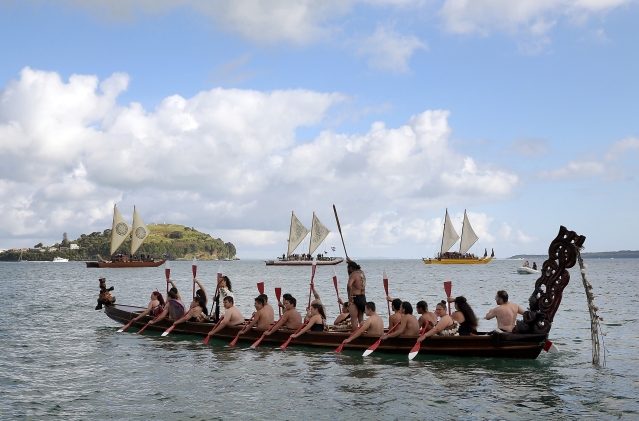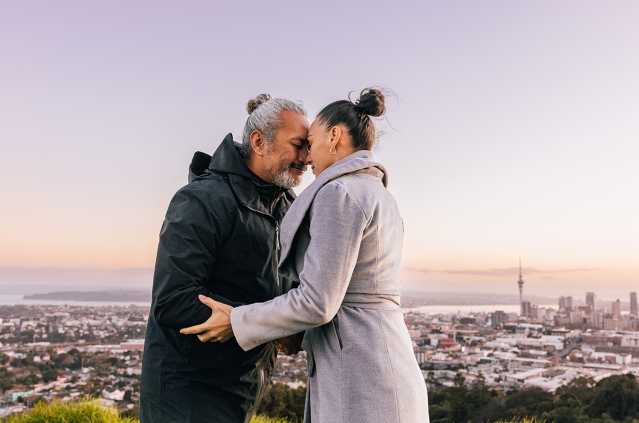TE WHIRIWHIRI KI NGĀ MANA WHENUA I MUA I TE TONO i TE WHAKAAETANGA WAIHANGA KIRIATA
Mana whenua consultation for filming permissions
When planning to film in Tāmaki Makaurau Auckland, productions are expected to engage with mana whenua involving them in the consultation process which builds relationships. The legal term for Māori groups as they relate to engagement with Auckland Council is ‘mana whenua’ (spiritual and cultural authorities of the land). Whereas in conversation most groups prefer to be referred to as ‘iwi’ (tribes), ‘hapū’ (sub-tribes) and tangata whenua.
Mana whenua possess invaluable cultural knowledge. Engaging with them allows you to seek guidance and collaborate for cultural accuracy throughout production.
Engaging with mana whenua in Auckland goes beyond a formality; it fosters respect, relationships, and an authentic representation of the region's cultural heritage in your production.
Cultural sensitivity and respect
Mana whenua's deep connection to the land and cultural heritage should be respected. Engaging with them ensures a culturally authentic representation and navigates sensitivities.
Notifications and information sharing
Early engagement allows you to inform mana whenua about your filming plans and enables them to share insights, historical significance, and concerns about the locations.
Seeking permission approvals
Mana whenua play a vital role in granting permission for filming on their ancestral lands. Engaging with them shows commitment to obtaining approvals in a culturally appropriate manner, preserving the location's integrity.
Relationship building and trust
Engaging fosters relationships, understanding of cultural heritage, and potential collaborations for future storytelling opportunities.
Screen Auckland’s role
Screen Auckland’s role is to connect film productions to relevant iwi and hapū groups, and advise on protocols, culturally sensitive areas, likely costs and timeframes to receive permission to film on iwi land, as well as the best approach to get the best outcomes, and build meaningful and ongoing relationships.
It is important to note that Screen Auckland’s role is that of a connector rather than a negotiator when it comes to additional costs and time frames that may arise from cultural assessments and operations carried out by iwi.
Iwi engagement
Iwi engagement is a key step in the permit process for filming on location Tāmaki Makaurau Auckland.
Early and comprehensive consultation with relevant mana whenua groups is the best way to reduce the risk of unexpected replanning of your shoot. Consultation with relevant iwi groups before filming begins is recommended. See Navigating Location Permissions below for helpful resources, including the mana whenua consultation tool, to identify which iwi to consult with.
- Maunga (mountain) locations
Before seeking permission to film, Screen Auckland recommends that Location Managers consider if the location where they wish to shoot on is either one of Tāmaki Makaurau Auckland’s maunga (mountains).
If in doubt, please contact us to check your location’s status.
- Sites and Places of Significance to Mana Whenua
There are locations across Tāmaki Makaurau Auckland which have cultural significance to mana whenua. Under current legislation in the Auckland Unitary Plan, these are called Schedule 12 Sites and Places of Significance to Mana Whenua (SPSMW).
Auckland Council’s Policy and Planning Committee has approved a change to the Auckland Unitary Plan (Plan Change 106), making it simpler to film on publicly managed sites of significance to mana whenua.
Most short-term filming on these sites can now be managed through the film permit process. To achieve this, the production must complete a higher level of engagement and consultation with mana whenua.
The application and activity must be consistent with any relevant iwi film protocol, iwi planning document, or cultural impact assessment prepared for the filming activity. Filming must maintain access for customary activities and apply tikanga as informed by mana whenua.
Productions (of all scales) must allow at least 25 working days to process a SPSMW specific film permit.
To issue a permit, we require clear documentation confirming that appropriate mana whenua groups (iwi and hapū) have been consulted.
To learn more about the next steps, please talk to our Screen Auckland Film Facilitators to discuss location feasibility.
- Mana whenua consultation tool
If your shoot is for general filming that does not involve maunga (mountains) or sites and places of significance to mana whenua, you will be invited to use the Mana Whenua Consultation Tool in your application.
This resource tool serves as a bridge between your production and the rich cultural heritage associated with the locations you wish to capture. Mana Whenua consultation should begin early to allow time for feedback and consideration, avoiding potential delays in the permitting process.
- Building bridges with iwi
Some sites will require written support by iwi to film there, and your Film Facilitator will let you know if this is the case when you submit an application.
Prepare a clear and comprehensive message outlining the nature of your shoot and why you would like to use that location. Be mindful of the cultural sensitivity surrounding the land and express your commitment to honouring the heritage and protocols associated with it.
For productions from outside of Aotearoa New Zealand, we encourage you to connect with the guides and tour providers at Treasures of Tāmaki Makaurau for an introduction to local history.A Treasure of Tāmaki Makaurau is a Māori-owned business that provides a visitor experience that protects and preserves Māori cultural heritage and carries the relevant mana whenua endorsement(s).
It is important to note that cultural insights or experiences from Treasures of Tāmaki Makaurau providers are intended to enhance a production’s experience in Auckland. This does not replace mana whenua engagement for your chosen filming locations.
- Gaining support: crafting your message
Provide details about the proposed dates, duration, and any potential impacts on the environment or community.
Ensure your message conveys sincerity, respect, and a genuine desire to collaborate. Proper consultation processes can come with a cost and in some instances, a cultural induction, pōwhiri, karakia or koha may be requested.
By engaging in meaningful dialogue, you can create a mutually beneficial partnership. It is likely that once the iwi has observed you and your production company conduct your business, future filming permissions could become smoother.
To learn more about the next steps, please talk to our Screen Auckland Film Facilitators.
- Ensuring ongoing collaboration
Please note that while the Mana Whenua Consultation Tool initiates initial engagement, ongoing direct communication with iwi is crucial. Maintain open dialogue throughout the entire process, to ensure ongoing collaboration and respect for iwi cultural knowledge and authority.
Learn more about our culture and the indigenous tribes of Tāmaki Makaurau Auckland.
Kia pai tō mahi, kia pai tō haerenga. Toitū te whenua.
Go well in your work, go well on your journey. Let the permanence of the land remain intact.

